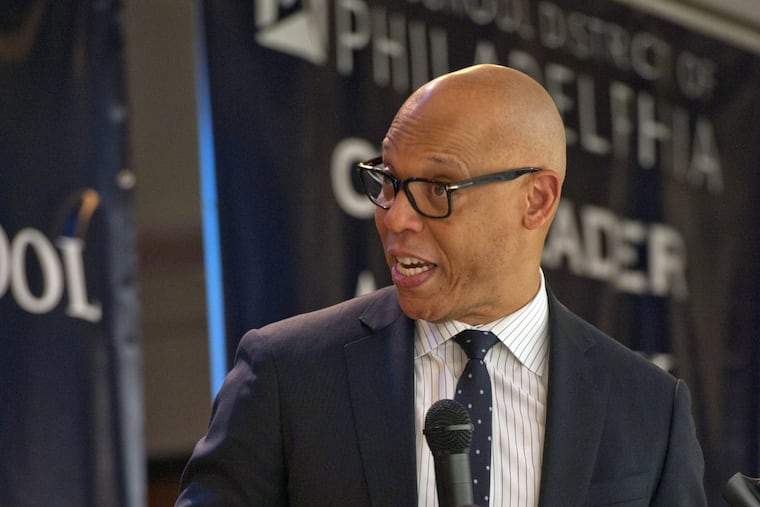SRC adopts $3.2B Philly school budget - with question marks
To enact the spending plan, the Philadelphia School District is still banking on what Mayor Kenney proposed in March: $700 million in new money from the city funded in part through a property tax hike. But City Council has publicly balked at that sum, saying that taxpayers are already overburdened.

The School Reform Commission on Thursday night adopted a $3.2 billion budget that provides for some new teachers and building repairs — but comes with an asterisk appended.
>>READ MORE: Banking on city cash, Philly school district introduces $3.2B budget
To enact the spending plan, the Philadelphia School District is still banking on what Mayor Kenney proposed in March: $700 million in new money from the city funded in part through a property tax increase. City Council, however, has balked at that sum, saying that taxpayers are already overburdened.
>>READ MORE: Mayor Kenney's budget wish list: Higher property taxes, transfer fees to fund extra $1 billion for schools
Council has until June 30 to adopt its budget, so in a way, Thursday's action by a lame-duck SRC could be a placeholder. If all of the new city money does not come through, district officials said an accelerated plan to fix the district's aging, and in spots environmentally problematic, buildings would be jeopardized.
That $150 million plan, which includes an expanded lead paint abatement program, "is desperately needed," Uri Monson, the district's chief financial officer, said as he outlined the budget to the commission.
In addition to the accelerated spending on repairs, the district would have to reconsider other investments if Council does not approve the new revenue proposed by Kenney, Monson said.
>>READ MORE: Without $700M, Philly might not be able to fix crumbling schools, Hite and Kenney say
The prospect that Council would not deliver the money drew questions — and one dissenting vote — before the commission passed the budget.
"This budget is an illusion built on shifting sands," Commissioner Bill Green said before voting against the plan, which passed 3-1. He cast doubt on whether Council would pass a property-tax increase ahead of an election next year — predicting that Kenney would campaign on trying to raise money for schools and blaming Council for not doing it. Council members, meanwhile, could tout holding down property taxes, Green said.
Council took a step Wednesday toward approving Kenney's proposed tax changes, advancing increases in the real estate transfer tax and homestead exemption and also moving ahead with the mayor's proposal to slow down scheduled reductions in the city's wage tax.
>>READ MORE: City Council tweaks mayor's tax proposal, voices need for greater property-tax relief
In response to Green, Estelle Richman, the chair of the commission, said voters would hold Kenney and Council accountable for their actions toward the school district.
"Don't undersell the voters in Philadelphia," Richman said.
The budget covers the education of 130,000 students in traditional public schools and 70,000 in charters. Year over year, expenditures jumped 5.3 percent, to $3.1 billion. The budget does not anticipate any school closures for 2018-19.
Among the new investments the spending plan would pay for: an expansion of the district's early literacy effort, previously focused on kindergartners through third graders, to add fourth- and fifth-grade supports; classroom modernization work at 11 schools; new special education, music and English for Speakers of Other Languages teachers; more money for art and music supplies; and more financial support for struggling schools and students.
"The investments we have made in our schools are making a difference," including in graduation rates, attendance and school climates, Superintendent William R. Hite Jr. said Thursday. "While we are proud of these achievements, we know that this progress must reach more students and more schools."
The biggest increases in the budget come from increases in payments to charter schools — the district will be spending nearly $1 billion of its budget on charter costs next year — debt service, salaries, and pension costs.
Without the city money, the district would project a deficit in Year 3 of its five-year plan, an outcome the mayor has said is unacceptable. But Council members, including President Darrell L. Clarke, and others have said they are not on board with raising taxes now for a budget gap that hasn't opened up yet, and that the state needs to step in, too.
In addition to passing the budget, the SRC on Thursday took a number of actions related to charter schools, including approving a new school it had previously denied. Philadelphia Hebrew Public School was approved to open in East Falls for the 2019-2020 school year, serving up to 468 students in grades K-5 during its five-year term.
The school will be run by Hebrew Public, which operates three charter schools in New York. Proponents said the new school would be "diverse-by-design" and focus on global citizenship, with instruction in Modern Hebrew.
The SRC also renewed Laboratory Charter School of Communications and Languages, after previously voting there were grounds not to renew it. District officials said the school's financial health was improving, though not all problems were fixed. The commission also approved Ad Prima Charter School to move one of its campuses from Kensington to Cedarbrook.
But it denied a proposed charter school by Asociación Puertorriqueños en Marcha, which drew a number of supporters Thursday, including former Philadelphia Common Pleas Court Judge Nelson Diaz.